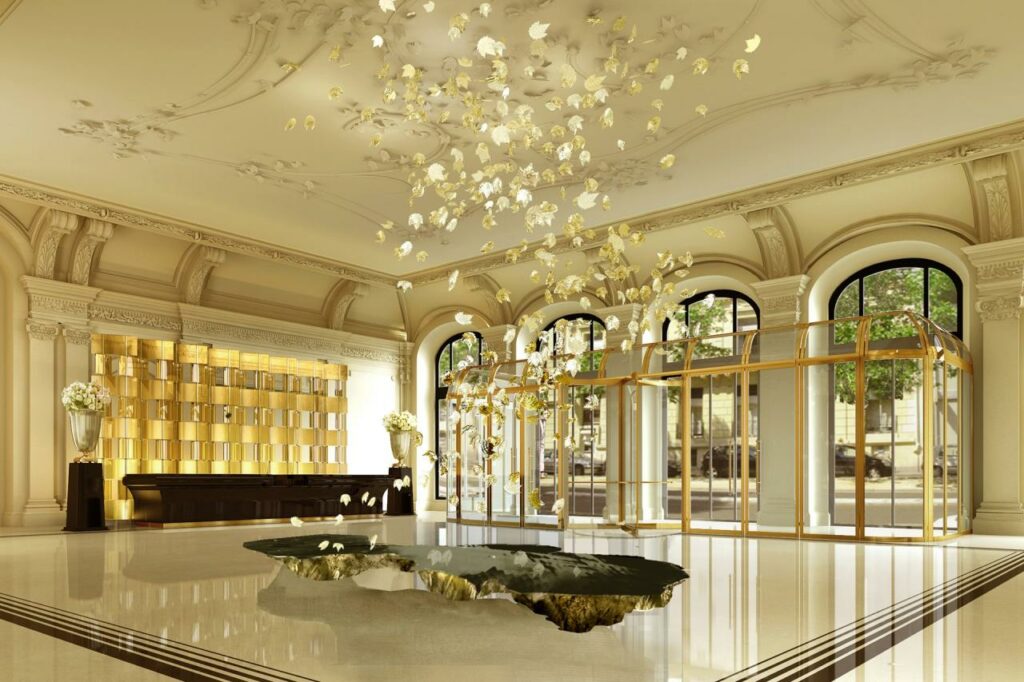Luxury hotels near popular tourist attractions in Paris: Imagine waking up to the Eiffel Tower shimmering in the morning light, or stepping out your hotel door directly onto the Champs-Élysées. This isn’t a dream; it’s the reality of staying in one of Paris’s many luxurious hotels nestled near iconic landmarks. From the opulent grandeur of classic Parisian hotels to the sleek modernity of contemporary establishments, the city offers a diverse range of high-end accommodations to suit every discerning traveler.
This exploration dives into the world of Parisian luxury, examining the defining characteristics of these hotels, their prime locations, exceptional amenities, and the unforgettable experiences they provide.
We’ll delve into the specifics of what constitutes “luxury” in a Parisian context, comparing different hotel chains and independent gems. We’ll pinpoint the top tourist attractions and analyze the pros and cons of staying nearby, providing insights into pricing, booking options, and the overall guest experience based on real reviews. Get ready to discover your perfect Parisian escape.
Defining “Luxury” in Parisian Hotels
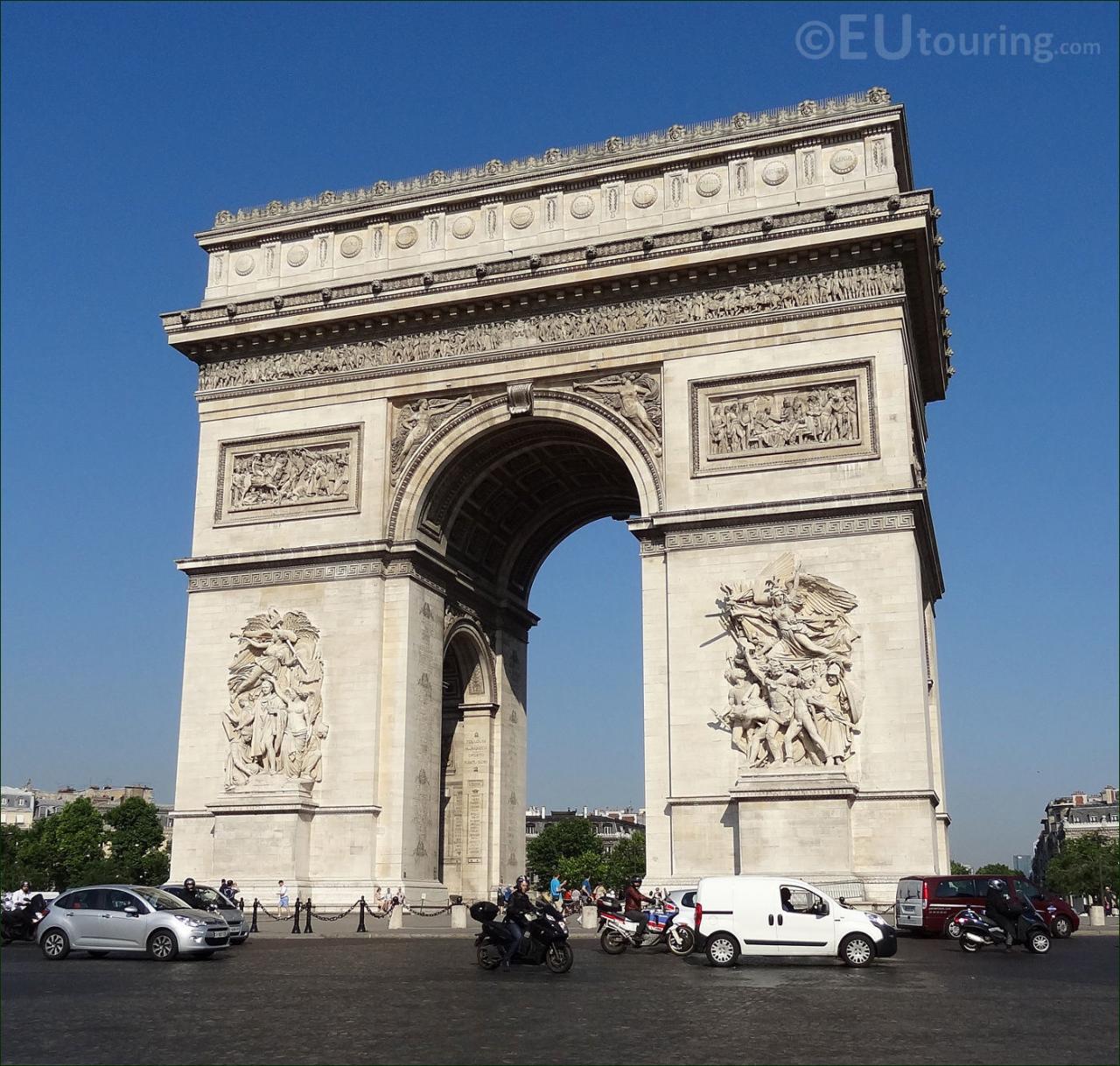
Luxury in Parisian hotels transcends mere opulence; it’s an experience meticulously crafted to evoke the city’s unique charm and history. It’s about impeccable service, unparalleled attention to detail, and a setting that seamlessly blends Parisian elegance with modern comfort. The price point, while undeniably significant, reflects the holistic experience offered, not just the physical amenities.Defining luxury in this context involves a complex interplay of factors.
Location, for instance, plays a crucial role. Proximity to iconic landmarks like the Eiffel Tower, the Louvre, or the Champs-Élysées significantly enhances the value proposition. However, a secluded, tranquil setting in a charming arrondissement can also be considered luxurious, offering a different kind of exclusivity. The level of personalized service is paramount; from bespoke concierge services to anticipating guests’ needs before they’re even voiced, a truly luxurious Parisian hotel prioritizes individual attention.
Finally, the amenities, while expected to be high-end, must also reflect a sense of Parisian style and sophistication, whether it’s through exquisite décor, a Michelin-starred restaurant, or a spa offering unique treatments.
Indulge in Parisian luxury near iconic landmarks like the Eiffel Tower and Louvre Museum. But if you’re planning a family trip and seeking a different kind of magic, consider the convenience of best value hotels near Disneyland with free shuttle service for a magical experience. Back in Paris, those luxury hotels offer unparalleled service and breathtaking views, making your trip truly unforgettable.
Luxury Hotel Chains versus Independent Establishments
Large hotel chains, such as Four Seasons, Ritz-Carlton, and Mandarin Oriental, typically offer a consistent level of luxury across their global portfolio. In Paris, these brands leverage their established reputations and resources to provide impeccable service, lavish amenities, and prime locations. However, independent boutique hotels often present a more intimate and personalized experience, sometimes showcasing unique architectural features or reflecting a particular Parisian aesthetic.
For example, a small, family-run hotel in the Marais district might offer a more authentically Parisian experience than a large chain hotel, even if the latter boasts a more extensive list of amenities. The choice between a chain and an independent hotel often boils down to personal preference regarding the desired level of formality and the type of atmosphere sought.
Unique Selling Propositions of Parisian Luxury Hotels
Parisian luxury hotels possess unique selling propositions that distinguish them from their counterparts in other global cities. The inherent romance and history of Paris itself significantly contribute to the allure. Hotels often incorporate elements of Parisian history and culture into their design and services, creating an immersive experience that goes beyond the typical luxury hotel stay. This might involve showcasing artwork by local artists, offering curated experiences centered around Parisian culture, or even featuring historical elements within the hotel’s architecture.
The level of personalized service, often exceeding expectations, further enhances the experience. Concierges are not just providers of information; they are orchestrators of unforgettable experiences, securing coveted reservations, arranging private tours, and anticipating guests’ every need with remarkable foresight. The sheer density of world-class cultural attractions, restaurants, and shopping within walking distance of many luxury hotels also contributes to their unique appeal.
This unparalleled accessibility allows guests to effortlessly immerse themselves in the Parisian lifestyle.
Proximity to Popular Tourist Attractions
Choosing a luxury hotel in Paris often hinges on its proximity to the city’s iconic landmarks. The ideal location balances luxurious comfort with easy access to the sights and sounds that make Paris unforgettable. Proximity isn’t just about convenience; it’s about maximizing your Parisian experience and minimizing wasted time on transportation. This section examines the relationship between luxury hotel zones and the city’s most popular attractions.
Top 5 Parisian Tourist Attractions and Hotel Proximity
The following table details the top five most popular tourist attractions in Paris, their locations, the proximity to potential luxury hotel zones, and public transport accessibility. This information is crucial for discerning travelers seeking both opulence and effortless exploration.
| Attraction Name | Location | Proximity to Luxury Hotel Zones | Public Transport Accessibility |
|---|---|---|---|
| Eiffel Tower | Champ de Mars, 7th arrondissement | Close proximity to luxury hotels in the 7th arrondissement, including hotels along the Seine River. | Excellent; served by multiple Metro lines (RER C, Metro 6, 8, 9) and bus routes. |
| Louvre Museum | 1st arrondissement | Within walking distance of many luxury hotels in the 1st and surrounding arrondissements. | Excellent; served by multiple Metro lines (1, 7, 14) and bus routes. |
| Arc de Triomphe | 8th arrondissement, Champs-Élysées | Numerous luxury hotels are located along the Champs-Élysées and in the surrounding 8th arrondissement. | Excellent; served by Metro lines (1, 2, 6) and bus routes. |
| Notre Dame Cathedral | 4th arrondissement, Île de la Cité | Luxury hotels are slightly further away, primarily located in the 1st, 4th, and 5th arrondissements. | Good; served by Metro lines (4, 7, 11) and bus routes. Walking distance is also feasible from many hotels. |
| Palace of Versailles | Versailles (outside Paris) | Luxury hotels are not directly adjacent; requires travel outside of Paris. Many luxury hotels offer concierge services to arrange transportation. | Requires train travel (RER C) from central Paris. Travel time is approximately 40 minutes. |
Advantages and Disadvantages of Hotel Proximity to Attractions
Staying near popular attractions offers undeniable advantages and some potential drawbacks. Understanding these nuances is crucial for selecting the perfect Parisian hotel.The advantages of staying near a major attraction include significantly reduced travel time, allowing for more time spent exploring and less time commuting. This is particularly beneficial for travelers with limited time in the city or those who prefer a slower pace of sightseeing.
Moreover, the convenience of being close to restaurants, shops, and other amenities often clustered around popular attractions adds to the overall appeal. For instance, staying near the Eiffel Tower allows for spontaneous evening strolls to admire the illuminated monument.Conversely, hotels located directly next to major attractions often come with higher price tags, reflecting the premium location. The proximity can also mean increased noise levels, particularly during peak tourist seasons.
Furthermore, the immediate vicinity might be crowded with tourists, detracting from the tranquil atmosphere some travelers seek in a luxury hotel. For example, a hotel right next to the Louvre might experience higher foot traffic and noise than one a short walk away.
Luxury Hotel Amenities and Services
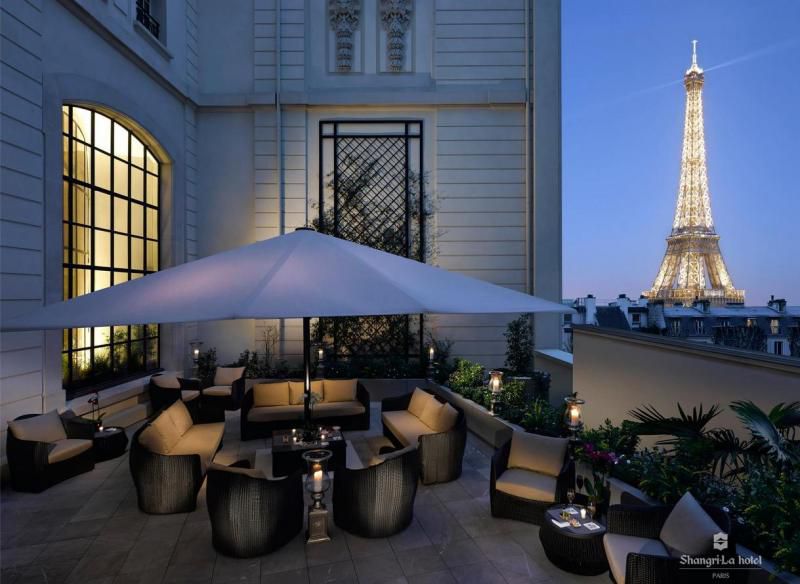
Stepping into a Parisian luxury hotel near a major attraction is more than just securing a room; it’s about immersing yourself in an experience. These establishments go above and beyond, offering a curated collection of amenities and services designed to pamper and impress even the most discerning traveler. The level of service and the attention to detail are key differentiators, setting these hotels apart from the ordinary.Luxury hotel amenities in Paris often revolve around personalized service, exquisite comfort, and unparalleled access.
Indulge in Parisian luxury near iconic landmarks like the Eiffel Tower, choosing from opulent hotels offering unparalleled service. But if ocean breezes and breathtaking views are more your style, consider a completely different kind of romantic escape; check out best romantic getaways with ocean views and private balconies for a truly unforgettable experience. Back in Paris, however, the city’s charm and sophisticated hotels await those seeking a different kind of magic.
The goal is to create a seamless and unforgettable stay, making your Parisian adventure even more memorable.
Typical Amenities in Parisian Luxury Hotels
Parisian luxury hotels typically offer a range of amenities designed to enhance guest comfort and experience. These amenities cater to a variety of needs, ensuring a truly luxurious stay. From the moment you arrive, expect a level of service that anticipates your every need.
Expect to find opulent accommodations featuring high-thread-count linens, plush robes, and high-end toiletries. Many rooms boast breathtaking views of iconic Parisian landmarks. Beyond the rooms themselves, expect access to world-class dining experiences, often with Michelin-starred restaurants on-site. These restaurants provide a sophisticated culinary journey, reflecting the city’s rich gastronomic heritage. A fully equipped fitness center, often with state-of-the-art equipment and personalized training options, is a standard feature.
For relaxation and rejuvenation, most luxury hotels offer a spa with a comprehensive menu of treatments, including massages, facials, and body wraps. Finally, the dedicated concierge service is invaluable, offering personalized assistance with reservations, transportation, and sightseeing arrangements. They are your personal gateway to experiencing the best of Paris.
Comparative Amenities of Parisian Luxury Hotels
The following table highlights the unique amenities offered by three leading Parisian luxury hotels, showcasing the diversity of experiences available.
| Hotel | Unique Amenities |
|---|---|
| Hotel Plaza Athénée | Dior Spa, private butler service, stunning Eiffel Tower views from many rooms, Michelin-starred restaurants (including Alain Ducasse’s). Known for its elegant and sophisticated atmosphere. |
| Four Seasons Hotel George V | Extensive art collection throughout the hotel, exceptional floral displays, three Michelin-starred restaurants, a stunning indoor pool and spa. Renowned for its impeccable service and luxurious design. |
| Le Bristol Paris | Private garden, exceptional children’s facilities (including a dedicated kids’ club), a rooftop terrace with panoramic city views, a renowned spa with a hammam. Famous for its old-world charm and family-friendly atmosphere. |
A Hypothetical Luxury Hotel Experience Package
Imagine a three-night stay at the Hotel Plaza Athénée, encompassing a curated experience designed for ultimate indulgence.
This package, “Parisian Perfection,” would include: a luxurious suite with Eiffel Tower views; daily breakfast served in your room; a 60-minute couples massage at the Dior Spa; a private chauffeured car for airport transfers and sightseeing; a private dinner at Alain Ducasse’s restaurant; and a personalized shopping experience with a stylist at a renowned Parisian department store. The package would also include access to the hotel’s fitness center and concierge services.
This package is designed to provide an unforgettable and seamless Parisian experience, catering to the needs of discerning travelers seeking the ultimate in luxury and convenience.
Price Ranges and Booking Options
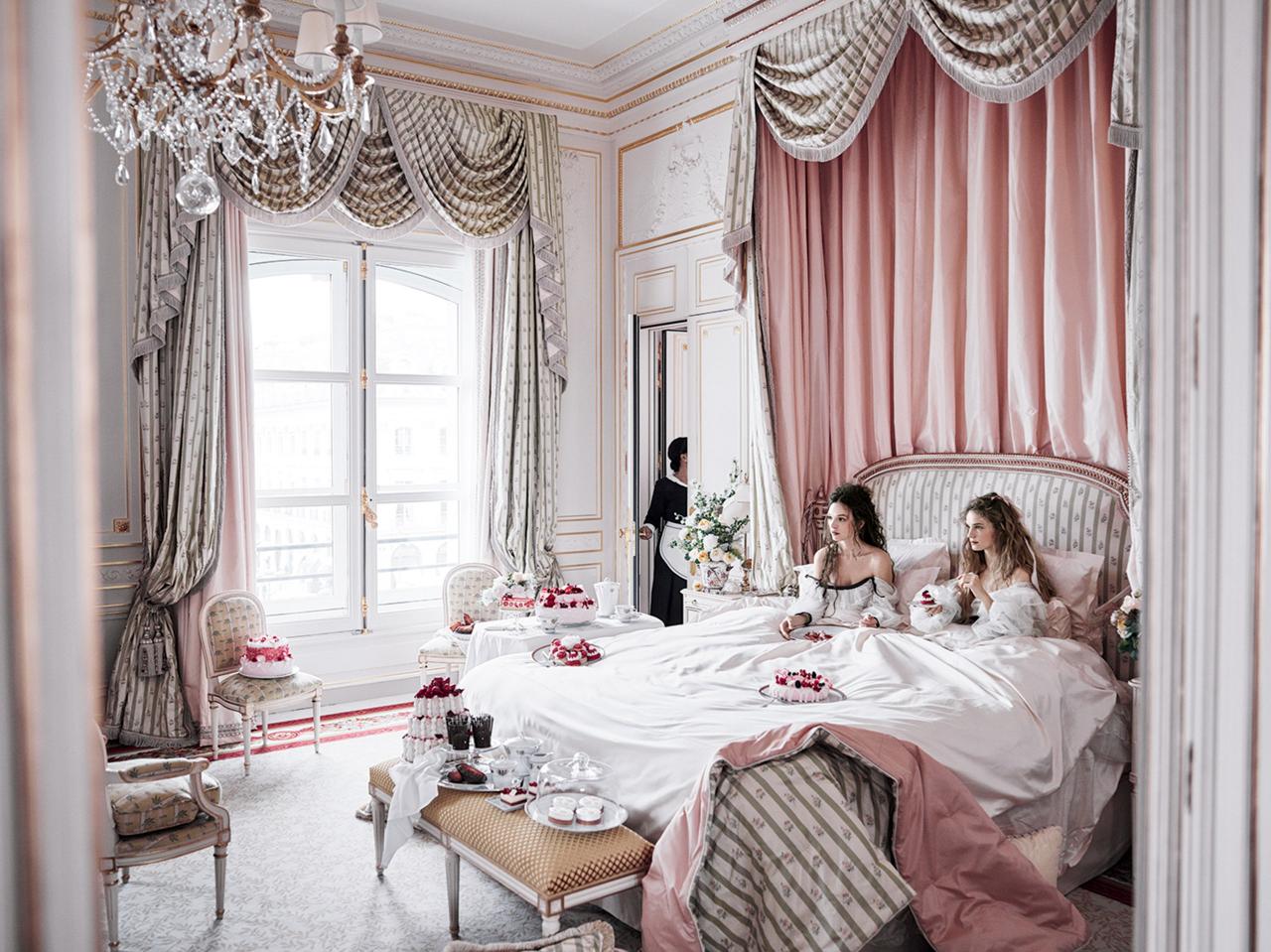
Securing a luxurious stay in Paris near its iconic landmarks requires careful consideration of pricing and booking strategies. The cost of a luxurious Parisian hotel experience varies significantly depending on factors like the season, room type, and the hotel’s reputation. Understanding these variables is crucial for planning a memorable yet budget-conscious trip.The price of luxury varies greatly depending on factors such as seasonality and room type.
Understanding these fluctuations is key to securing the best value for your Parisian getaway.
Seasonal Price Fluctuations
Prices for luxury hotels near popular Parisian attractions fluctuate dramatically throughout the year. Peak season, encompassing summer months (June-August) and major holidays (Christmas, New Year’s), commands significantly higher rates. Expect to pay a premium, potentially double or even triple the off-season price, for a comparable room during these periods. Conversely, shoulder seasons (spring and autumn) offer a more moderate price point, providing a balance between pleasant weather and affordable luxury.
The off-season (typically November-March, excluding holidays) generally offers the most budget-friendly rates, although some services might have reduced availability. For example, a standard double room in a five-star hotel near the Eiffel Tower might cost €800-€1200 per night during peak season, dropping to €400-€600 during shoulder seasons, and potentially as low as €250-€400 during the off-season. These are estimates, and actual prices will vary based on specific hotels and room types.
Room Type and Pricing, Luxury hotels near popular tourist attractions in Paris
Luxury hotels in Paris offer a wide range of room types, each influencing the final price. Basic double rooms will naturally be less expensive than suites, which can often cost several thousand euros per night, especially in the most prestigious hotels. Larger suites often include additional amenities like private balconies overlooking famous landmarks, butler service, and exclusive access to hotel lounges.
The price difference between a standard room and a suite can be substantial, sometimes exceeding several hundred euros per night. Consider your budget and desired level of luxury when choosing a room type.
Booking Platforms and Their Advantages and Disadvantages
Several online booking platforms cater to luxury hotel accommodations. Direct booking through the hotel’s website often offers the best rates and exclusive benefits, such as complimentary upgrades or early check-in. However, comparing prices across platforms like Expedia, Booking.com, and Virtuoso is recommended to ensure you’re securing the best possible deal. Some platforms specialize in luxury travel and offer concierge services, potentially adding value beyond just finding a room.
Conversely, booking through third-party sites might involve additional fees or less flexibility in terms of cancellation policies. It is vital to carefully review all terms and conditions before finalizing your booking.
Pricing Strategies of Parisian Luxury Hotels
Parisian luxury hotels employ various pricing strategies to maximize revenue. Dynamic pricing, adjusting prices based on demand and availability, is common, leading to fluctuating rates even within the same hotel. Package deals, often including breakfast, spa access, or airport transfers, can offer good value, but always compare the total cost to individual pricing. Some hotels offer loyalty programs rewarding repeat guests with discounts or exclusive perks, encouraging repeat business.
Understanding these strategies helps travelers find the best deals by booking strategically and comparing prices across different platforms and packages.
Visual Representation of Luxury Hotels
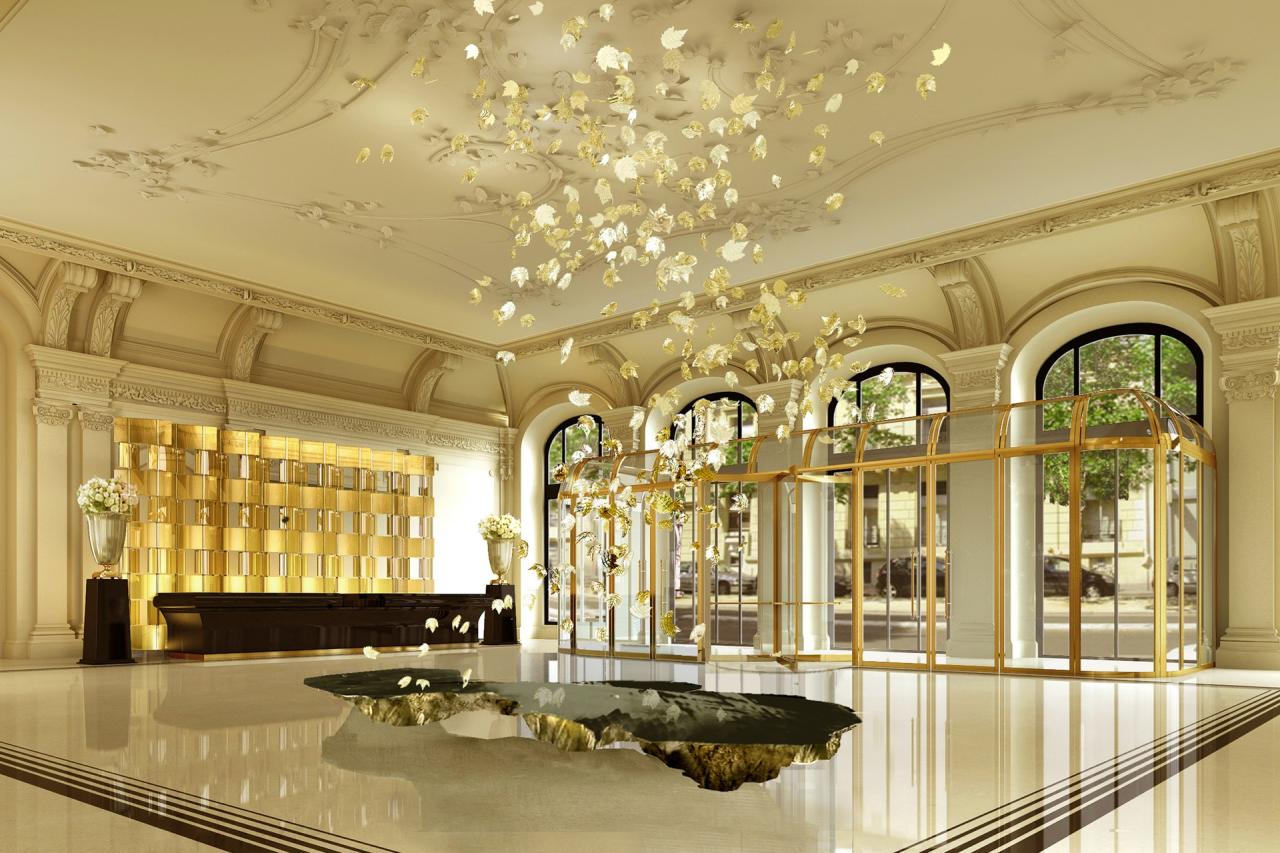
The visual identity of a Parisian luxury hotel is paramount, contributing significantly to the overall guest experience. More than just a place to sleep, these establishments are meticulously designed to evoke a sense of timeless elegance, reflecting the city’s rich history and sophisticated culture. Architectural styles, interior design, and the carefully curated views all play crucial roles in creating this luxurious ambiance.Architectural Styles and Interior Design of Parisian Luxury Hotels
Haussmannian Architecture and its Modern Interpretations
Many luxury hotels in central Paris occupy buildings reflecting the Haussmannian architectural style, characterized by its grand scale, symmetrical facades, ornate detailing, and elegant stonework. Think wide boulevards, high ceilings, and meticulously crafted balconies. Modern interpretations of this style often incorporate contemporary elements while retaining the classic elegance, perhaps using modern materials like polished steel alongside traditional limestone. Interior design typically features high ceilings adorned with intricate moldings, rich wood paneling, and luxurious fabrics like velvet and silk in deep, jewel-toned hues.
Crystal chandeliers and antique furniture pieces add to the overall opulence.
Belle Époque Elegance and its Modern Revival
Hotels built during the Belle Époque (roughly 1870-1914) often showcase a distinct architectural style blending elements of neoclassical, art nouveau, and eclectic designs. Expect elaborate facades with intricate ironwork, stained-glass windows, and decorative sculptures. Inside, these hotels often maintain their original grandeur with ornate plasterwork, marble floors, and lavishly decorated staircases. Modern revivals of this style often retain these historical features while updating amenities and incorporating contemporary design elements to maintain a balance between historical authenticity and modern comfort.
Think plush velvet seating, antique mirrors, and carefully selected artwork reflecting the period.
Modern and Contemporary Designs with Parisian Flair
Some newer luxury hotels embrace a more contemporary aesthetic, incorporating sleek lines, minimalist designs, and modern materials. However, even these modern spaces often incorporate nods to Parisian tradition, perhaps through the use of locally sourced materials, artwork by contemporary Parisian artists, or the incorporation of classic Parisian design elements in a reimagined way. Think polished concrete floors, minimalist furniture with clean lines, and large windows offering expansive city views.
The color palettes might be more muted, but the quality of materials and craftsmanship remain paramount, ensuring a luxurious experience.
Typical Visual Elements Contributing to Luxury Ambiance
The luxurious ambiance of Parisian hotels is carefully crafted through a multitude of visual details. Rich textures are paramount – think plush carpets, luxurious linens, and smooth marble surfaces. The lighting is carefully considered, often employing a combination of natural light and soft, ambient lighting to create a warm and inviting atmosphere. Artwork plays a crucial role, often featuring pieces by renowned French artists or contemporary works reflecting Parisian culture.
The use of fresh flowers, carefully chosen plants, and high-quality materials throughout the hotel contributes to the overall feeling of opulence and sophistication.
View from a Luxury Hotel Room Overlooking a Parisian Landmark
Imagine waking up to a breathtaking panorama of the Eiffel Tower, its iron latticework shimmering in the morning sun. From your expansive window, you see the city unfolding below, a tapestry of terracotta rooftops and tree-lined streets. The Seine River, a shimmering ribbon of silver, winds its way through the heart of Paris, reflecting the light. The air is crisp and carries the subtle scent of freshly baked bread from a nearby boulangerie.
The Eiffel Tower stands tall and proud, its graceful form a constant reminder of the city’s romantic charm. The view is not just a sight; it is an experience, a luxurious immersion in the heart of Paris.
Guest Experiences and Reviews: Luxury Hotels Near Popular Tourist Attractions In Paris
Online reviews significantly influence the perception and booking decisions of potential guests for luxury Parisian hotels. Analyzing these reviews reveals recurring themes concerning service quality, amenities, location, and overall value, providing valuable insights into the guest experience and the hotel’s reputation. A comprehensive understanding of these reviews allows hotels to identify areas for improvement and enhance their offerings.
The volume and nature of online reviews paint a vivid picture of the guest experience. Positive reviews frequently highlight exceptional service, luxurious amenities, and prime locations. Conversely, negative reviews often focus on issues such as inadequate staff responsiveness, subpar cleanliness, or underwhelming amenities compared to the advertised standards. These critiques, whether positive or negative, directly impact the hotel’s ranking, occupancy rates, and ultimately, its profitability.
Positive Guest Experiences
Positive guest experiences often revolve around exceptional service. Many reviews praise the attentiveness and professionalism of the staff, citing instances of personalized service, prompt assistance, and a genuine welcoming atmosphere. For example, reviews frequently mention the concierge’s helpfulness in securing reservations at popular restaurants or arranging private tours. Beyond service, the luxurious amenities are consistently highlighted. Guests often rave about the comfort and elegance of the rooms, the quality of the in-room amenities (such as high-end toiletries and plush bedding), and the sophistication of the hotel’s common areas, such as the spa or lounge.
The convenient location, often within walking distance of major attractions, is also frequently cited as a major positive. A review might state, “The location was perfect – steps away from the Louvre and easy access to public transportation.”
Negative Guest Experiences
Negative reviews frequently center on issues with service. Examples include slow or inattentive service, instances of rudeness or unprofessionalism from staff members, or a lack of responsiveness to guest requests. For instance, a guest might complain about long wait times for room service or difficulties contacting the front desk. Cleanliness is another recurring concern. Reviews may describe issues such as unclean rooms, poorly maintained bathrooms, or a lack of attention to detail in housekeeping.
Furthermore, some guests express disappointment with the amenities, citing instances where the amenities did not live up to expectations or were not properly maintained. For example, a review might mention a malfunctioning spa facility or outdated gym equipment. Finally, some negative reviews criticize the price-to-value ratio, suggesting that the hotel’s high cost does not justify the overall experience.
A common complaint might be, “The price was exorbitant, and the service didn’t match the cost.”
Impact of Reviews on Hotel Reputation
Online reviews significantly influence a hotel’s overall reputation and ranking. Positive reviews boost a hotel’s online visibility and attract more bookings, while negative reviews can deter potential guests and damage the hotel’s image. Hotels actively monitor online reviews to identify areas for improvement and address guest concerns. Responding to both positive and negative reviews professionally and promptly is crucial for managing online reputation and demonstrating a commitment to customer satisfaction.
Hotels often use review analysis to improve service, amenities, and overall guest experience, aiming to transform negative feedback into opportunities for growth and enhance their standing within the competitive luxury hotel market.
